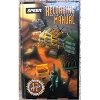LiveLife
Member
How about busting or confirming some reloading myths once-and-for-all for us new/seasoned reloaders?
It's been my observation that THR H/R section seems to get to the bottom of most reloading issues/problems rather quickly.
I did a search and found an old thread, but instead of "he said, she said" endless discussions, how about conclusively busting or confirming them? Please realize that some of us may want "hard proof" when you are busting or confirming myths so linked sources/attached pics/documents will be helpful or may be requested.
There's one that I keep seeing that I have never got a satisfactory answer to:
MYTH #1 - Shooting a lot of jacketed rounds will wear your barrel out.
Now, aren't barrels made from fairly hard metal? My guess is probably harder than copper/brass jacketing of most bullets. So if the jacketing is softer than the surface of the barrel, any wear would occur at the bullet surface and not the barrel surface? I have read that Glock/M&P Tennifer/Melonite treatment hardens the metal surfaces to hardness comparable to Tungsten carbide ... and that's pretty hard.
Here's another I keep seeing and even repeated myself:
MYTH #2 - When scrubbing leading out of barrels, you should only use copper scrubbing pad material, not copper plated steel/stainless steel.
Well, I know that copper is softer than most barrel materials, but if your barrel surface is hardened with Tennifer/Melonite treatment, would your "average" steel/stainless steel scrubbing pad material be able to scratch it?
MYTH #3 - WD40 will remove bluing on metal.
It's been my observation that THR H/R section seems to get to the bottom of most reloading issues/problems rather quickly.
I did a search and found an old thread, but instead of "he said, she said" endless discussions, how about conclusively busting or confirming them? Please realize that some of us may want "hard proof" when you are busting or confirming myths so linked sources/attached pics/documents will be helpful or may be requested.
There's one that I keep seeing that I have never got a satisfactory answer to:
MYTH #1 - Shooting a lot of jacketed rounds will wear your barrel out.
Now, aren't barrels made from fairly hard metal? My guess is probably harder than copper/brass jacketing of most bullets. So if the jacketing is softer than the surface of the barrel, any wear would occur at the bullet surface and not the barrel surface? I have read that Glock/M&P Tennifer/Melonite treatment hardens the metal surfaces to hardness comparable to Tungsten carbide ... and that's pretty hard.
Here's another I keep seeing and even repeated myself:
MYTH #2 - When scrubbing leading out of barrels, you should only use copper scrubbing pad material, not copper plated steel/stainless steel.
Well, I know that copper is softer than most barrel materials, but if your barrel surface is hardened with Tennifer/Melonite treatment, would your "average" steel/stainless steel scrubbing pad material be able to scratch it?
MYTH #3 - WD40 will remove bluing on metal.
Last edited:







